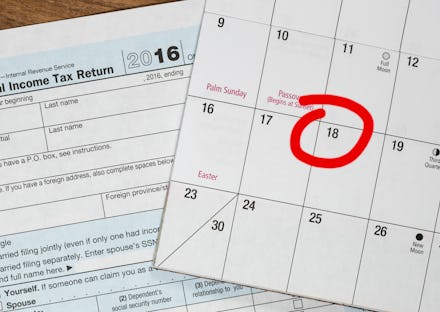Tax extension deadline 2017: How to get more time to file your forms for the 2016 tax year

You really can get an extension to file your taxes. It's super easy to apply online and snag an extension, and the government will give you until Oct. 16 to file. It's like the IRS is just handing out pink, fluffy unicorns dancing on rainbows, right?
Well, not so fast. But before we break the bad news, let's take a moment to think happy thoughts while looking at this adorable unicorn:
OK, back to business: Note that we wrote "file" your taxes, not "pay" your taxes. While you have until mid-October to get all your paperwork in order and filed, you still need to pay any tax you owe on tax day, which is April 18 this year.
Getting an extension may be more hassle than it's worth, since you have to cough up the cash now anyway. But for people who are still trying to find documents and pull together their return, the extra time can be a saving grace.
It's also not a bad option if you don't think you owe the IRS any money. After all, most Americans get refunds come tax day anyway. (And there is no penalty for filing your taxes late if the IRS owes you money.)
Not doing your taxes isn't an option. If you owe the IRS money, not filing your taxes can result in several kinds of penalties, and you'll still be on the hook for the tax bill you owe, which will accrue interest until you pay.
Here is how to get an extension and what to do if you can't pay your tax bill.
How to get an extension
Maybe you're waiting on a 1099 form for some freelance work you did, or perhaps you haven't been able to prepare your tax return because of a broken wrist. Maybe you just procrastinated.
It doesn't even matter why you need an extension to file your taxes. All you need to do is let the IRS know by filling out this form.
Oh, and you need to pay them.
But how do you know how much to pay if you haven't got all your documents? You estimate. You pay the government what you deem to be your total tax liability for 2016 based on the information you have.
The IRS recommends these free online services to file the extension. Once you've put in your extension paperwork, you have six months, which this year is until Oct. 16, to file your taxes with all documentation. Most states offer similar extension options, with tax filing deadlines in October and November.
What if I can't pay my taxes?
The temptation, if you are staring down a tax bill that is beyond what you can pay, might be to bail on filing altogether. That is not a good idea.
If you owe money to the IRS and fail to file on time, you will have to pay a "failure to file" penalty. If you don't pay your taxes on time, you'll owe a "failure to pay" penalty. And here's an IRS secret (hidden not-so-secretly on the IRS website): The failure to file penalty is worse than the failure to pay penalty.
"The failure to file penalty is usually 5% of the tax owed for each month, or part of a month that your return is late, up to a maximum of 25%. If your return is over 60 days late, there's also a minimum penalty for late filing; it's the lesser of $205 or 100% of the tax owed, " according to the IRS.
The failure to pay penalty, on the other hand, is "generally 0.5% per month of your unpaid taxes."
So, file your taxes, even if you can't pay them.
Payment plans are absolutely an option
If you file a tax return (on time!) and pay what you can, the IRS will work with you to pay your tax bill over a manageable amount of time.
If your tax bill is under $50,000 and beyond your current means, you can sign up to pay in monthly installments by applying for a payment agreement online. You'll have to pay what you owe in 72 monthly payments or less (that's six years!), and any subsequent refunds will be applied to that debt until it's paid.
The government will take a check or payment by direct debit from a bank account, but direct debit is the way to go because the setup fees are lower.
A payment plan may seem like a drag, but it's way better than letting fines mount because you were too scared to deal with Uncle Sam altogether.
Sign up for The Payoff — your weekly crash course on how to live your best financial life. Additionally, for all your burning money questions, check out Mic's credit, savings, career, investing and health care hubs for more information — that pays off.